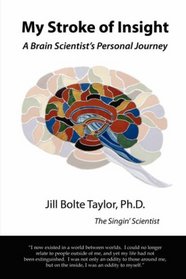What makes this book especially interesting is that the author is a brain researcher and describes and explains the way our brains work so anyone can understand.
We clearly have far more control over our daily experience than we imagine. Read this book to find out how and why.
With much insight, this book fascinates and, ultimately, inspires us to tend the gardens of our minds.
Highly recommended.
During the early history of neurology, strokes were informative "natural experiments:" by correlating specific lesions with specific neurological deficits, we learned about the normal functions of the different parts from the brain. However, there was little direct input from the patient. Dr. Jill Bolte Taylor is a striking exception. In 1996, the 37-year-old Harvard neuroanatomist experienced a massive stroke. Remarkably, she survived, made a full recovery in eight years, and describes her experiences in My Stroke of Insight.
She became more aware of how her brain works: while her left hemisphere was rendered dysfunctional, her functioning right hemisphere filled her with a sense of connectedness and inner peace. After some introductory chapters explaining her background and brain science, she describes the morning of the stroke and the weeks immediately following in great detail. Then the book takes on an almost New Age direction. By becoming more attuned to her right hemisphere, she chose to experience joy and compassion (and we can too).
I believe Dr. Taylor makes some important points: we can all improve our understanding of a patient's perspective and needs; the brain is a resilient, adaptive organ; becoming aware of neural processes can help us attain conscious control over our thoughts, emotions, and behavior. In short, through reading this book I started constructing the scaffold by which I can hope to understand "Eastern thought" (for the lack of a better term) on a scientific level. However, keep in mind that this book is about one person's experience, which is not necessarily generalizable. I found her writing style to be overly poetic and repetitive—how many times is she going to write Dr. Jill Bolte Taylor, hook into [neural loops], and step to the right—but heart-warming in its positive message.
The second-most helpful part of this book was the practical suggestions for interacting with someone who has had a stroke. For many, that part of the book alone is worth reading.
The story is short with the most details to befound in the morning of the actual stroke. Interspersed in the narrative are chapters about how the brain works, particularly the different roles and functions of the right and left hemispheres. Author Jill Taylor experiences a death of the neurons in the left side of the brain, the seat of language, mathematics, ego, and logic. This frees her right brain and leads to what she describes as nirvana, being one with the world.
While initially interesting, I found the description of the right and left functions to be eventually repetitive. The call for readers to free themselves from the tyranny of the left brain and experience the peace that the right brain brings was reiterated over and over. It left my(left) brain impatient.
Though not the most satisfying book in the beauty of its prose or the flow of the structure, I think its a worthy read for the insights scattered throughout.
Taylor's writing voice is somewhat bland, and full of stock phrases and cliche, but the woman's story is incredible. If a woman can recover - basically completely - from the size of a stroke she had, then there's hope for everybody. That's what makes the book so much worth reading.
Maybe just knowing she did it is enough, though. Watching her TED talk might be as good as reading the book.
Anyway, as much as Susan and I rolled our eyes at some of the passages, it still made us more hopeful (I need another word for hope - is there one?) for the future.
And it proved the tenacity of the human brain. FASCINATING! I almost didn't want to put it back into the PBS pool.




